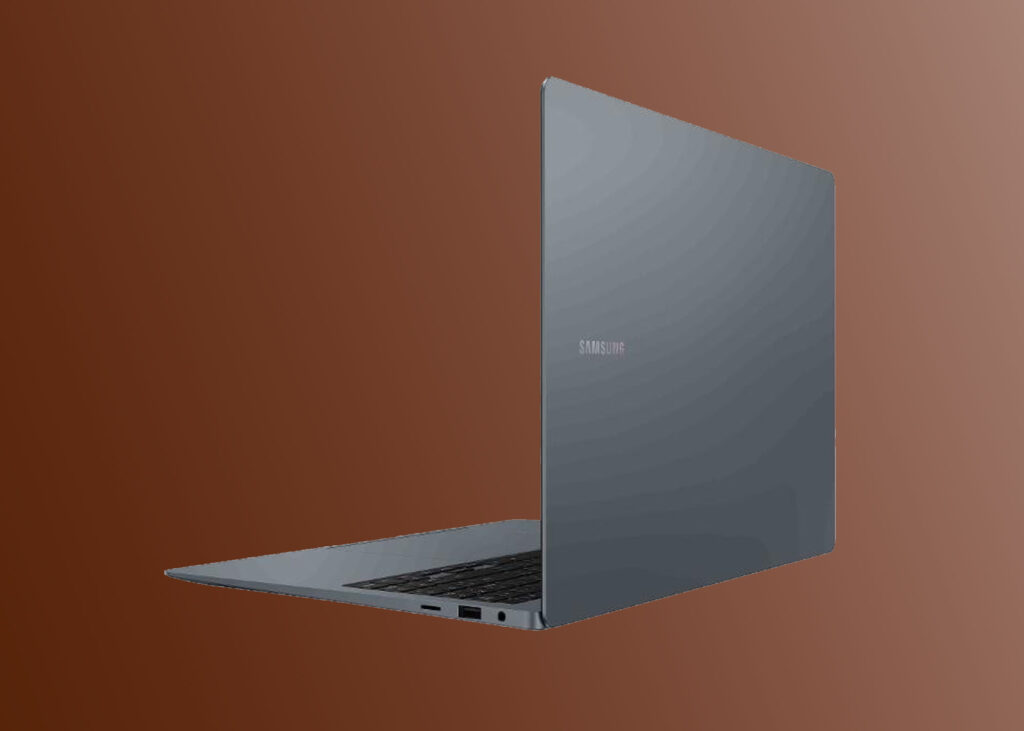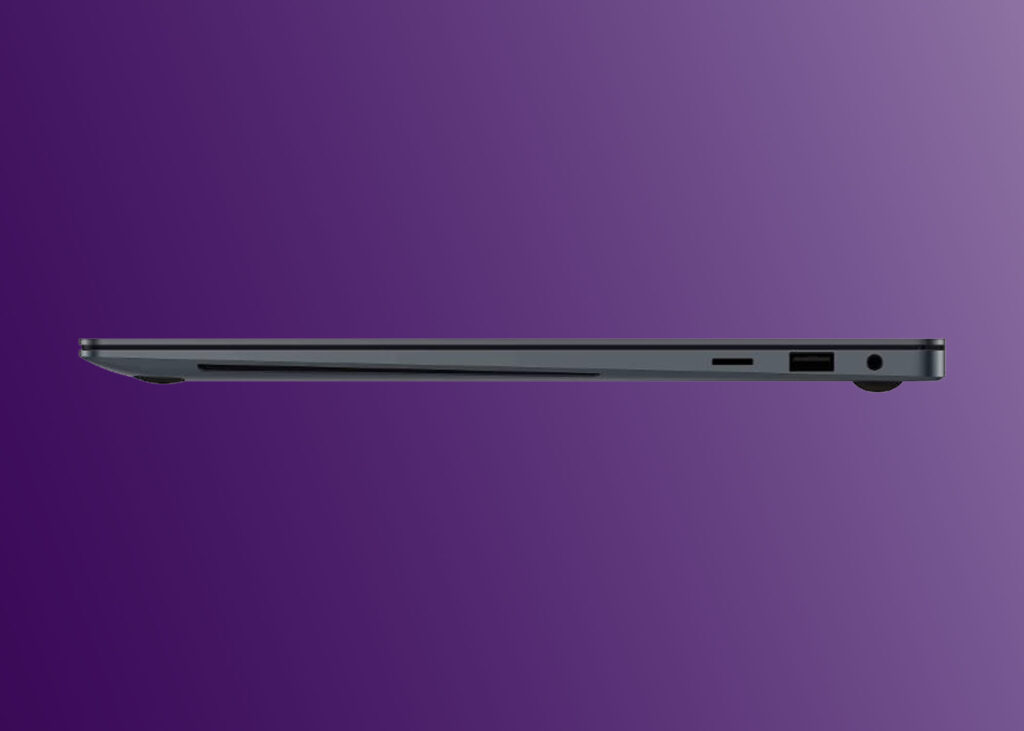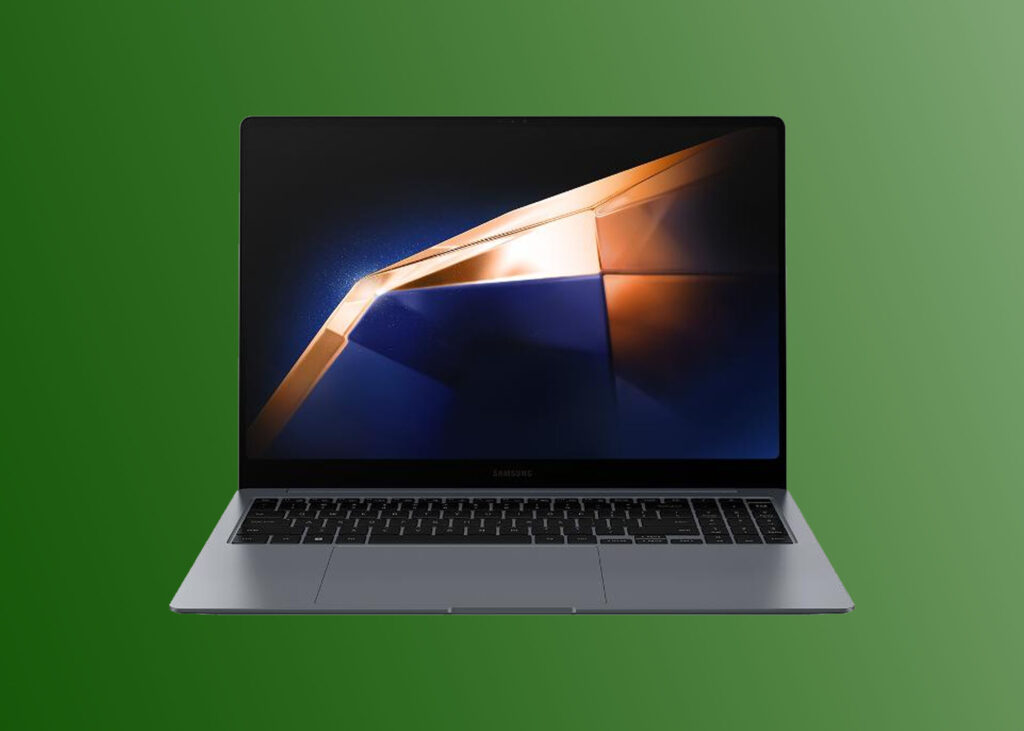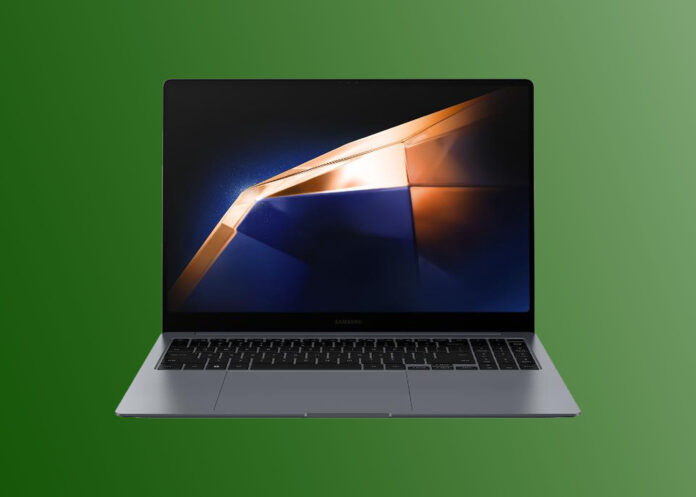In terms of appearance, the fresh Samsung Galaxy Book4 Pro closely resembles the outgoing Galaxy Book3 Pro. However, internally, it operates on Intel’s newest Meteor Lake Core Ultra 7 CPU. This results in heightened performance and improved battery longevity. The device retains its impressive 14-inch OLED display and high-quality construction akin to Apple products, though certain aspects such as the speakers remain unsatisfactory.
Pros:
Superior construction
Outstanding display
Exceptional battery performance
Cons:
Design lacks originality
Subpar speaker quality
Represents only a minor advancement
Samsung Galaxy Book4 Pro: Brief Review
If you admire the appearance of Apple’s MacBooks but favor or simply need the Windows environment, well, you have a solid option in the new Samsung Galaxy Book4 Pro. Like its predecessor, the quite similar Samsung Galaxy Book3 Pro, it draws its overall appearance and feel from the MacBook.
Thanks to its sleek wedge-shaped chassis, it bears the closest resemblance to Apple’s now-discontinued MacBook M1 Air in terms of design. However, for features and performance, it likely falls somewhere between the more recent and boxier MacBook Air 13-inch (M3) and the base model MacBook Pro 14-inch.
Offered in both 14-inch and 16-inch sizes, this 14-inch model has both strengths and weaknesses in comparison to Apple’s offerings. The Samsung Galaxy Book4 Pro’s OLED screen is a definite highlight with exceptional image quality and a 120Hz refresh rate. Additionally, it supports touch input. Apple simply cannot match this.
Conversely, the speakers of the Samsung Galaxy Book4 Pro are underwhelming and its trackpad is only satisfactory. Apple unquestionably outperforms in these aspects. Regarding performance, it closely competes with the Apple M2 chip, although the latest M3 arguably surpasses it. The laptop is equipped with Intel’s new Meteor Lake CPU in Intel Core Ultra 7 155H configuration, featuring six performance cores and eight efficiency cores.
Samsung claims the new Intel chip enhances the already impressive battery life of the Galaxy Book4 Pro by approximately 10%, and we observed almost 14 hours of video playback and over 11 hours of more intensive use. In essence, this laptop offers genuine all-day endurance.
On the downside, the design is undeniably derivative, the speakers are highly disappointing, and the trackpad is only satisfactory. However, overall, this isn’t merely one of the top Windows alternatives for MacBook enthusiasts. It can compete with any rival laptop in our 2024 best laptop guide.
Samsung Galaxy Book4 Pro: Cost & Availability
What is the price? $1,449 / £1,599
Where is it accessible? Accessible in the US and UK
Valued at $1,449 in the US and £1,559 in the UK for the basic model with 16GB of memory and a 512GB SSD, the Samsung Galaxy Book4 Pro is certainly premium priced but it’s not excessively expensive. It’s slightly more costly than a similarly equipped MacBook Air, but less expensive than the initial model of the 14-inch MacBook Pro.
Conversely, one can obtain Dell’s XPS 13 with the same Meteor Lake CPU, along with corresponding memory and storage specifications, for a slightly lower price, and the XPS 14 for approximately the same cost.
Nevertheless, the XPS 13 cannot be acquired with an OLED display, and with the XPS 14, an OLED panel can be configured, but it adds $300 / £200 to the cost. All of this indicates that the Samsung Galaxy Book4 Pro is not inexpensive, but it still presents a compelling value proposition.
Samsung Galaxy Book4 Pro: Specifications
The Samsung Galaxy Book4 Pro is available in two variants, with 14-inch and 16-inch sizes.
Here are the specifications for the Samsung Galaxy Book4 Pro:
| Component | Samsung Galaxy Book4 Pro 14-inch | Samsung Galaxy Book4 Pro 16-inch |
|---|---|---|
| Price | $1,449 / £1,599 | $1,749 / £1,699 |
| CPU | Intel Core Ultra 7 155H | Intel Core Ultra 7 155H |
| GPU | Intel Arc integrated graphics | Intel Arc integrated graphics |
| Screen | 14-inch, 2880 x 1800 AMOLED | 16-inch, 2880 x 1800 AMOLED |
| RAM | 16GB DDR5 | 16GB DDR5 |
| Storage | 512GB SSD | 512GB SSD (1TB in US) |
| Ports | 2x Thunderbolt 4 (USB-C), HDMI 2.1, USB-A 3.2, MicroSD, 3.5mm headphone jack | 2x Thunderbolt 4 (USB-C), HDMI 2.1, USB-A 3.2, MicroSD, 3.5mm headphone jack |
| Wireless | Wi-Fi 6e (802.11ax), Bluetooth 5.3 | Wi-Fi 6e (802.11ax), Bluetooth 5.3 |
| Camera | 1080p webcam | 1080p webcam |
| Weight | 1.23kg / 2.71lb | 1.56kg / 3.44lb |
| Dimensions | 312.3 x 223.8 x 11.6 mm (12.30 x 8.81 x 0.46 inches) | 355.4 x 250.4 x 12.5 mm (13.99 x 9.86 x 0.49 inches) |

Samsung Galaxy Book4 Pro: Design
High-quality construction
Design influenced by Apple
Highly portable
It cannot be denied. The resemblance of the Samsung Galaxy Book4 Pro to the Apple MacBook, particularly the MacBook Air with its wedge-shaped frame, is unmistakable. The Galaxy Book4 Pro closely mirrors it, from the tapered thickness of the chassis to the keyboard layout, the appearance of the trackpad, and the mechanics of the screen lid hinges and closure.
Samsung has nearly matched Apple’s renowned craftsmanship and engineering. The keyboard base is exceptionally sturdy, and the chassis feels robust, even though the alignment of various components doesn’t quite reach the level of Apple’s unparalleled precision.
However, there are areas where Samsung falls short compared to Apple. The speakers of the Samsung Galaxy Book4 Pro are far inferior to those of the MacBook Air, let alone the MacBook Pro. This is truly disappointing, and it’s difficult to comprehend why Samsung can’t provide this laptop with sound quality that matches its impressive OLED screen. Of course, this display is touchscreen-enabled, offering an additional feature that no MacBook provides.
Regarding the trackpad, while it meets the standards of Windows laptops, it lacks the precision and satisfaction of Apple’s haptic trackpad. On the positive side, Samsung has succeeded in offering a more extensive port selection than the MacBook Air. Alongside a pair of Thunderbolt USB-C ports, there’s a traditional USB-A, a full HDMI port, a microSD slot, and a headphone jack.
This achievement is remarkable considering the compact dimensions, with a thickness of just 11.6mm and a weight of 1.23kg. This laptop is exceptionally portable, a characteristic further enhanced by the diminutive 35W USB-C power adapter.
Overall, this is a finely designed and engineered machine across the board. Few, if any, Windows laptops can match its build quality. However, it is ultimately a design heavily influenced by Apple. Dell’s XPS laptops offer a much more distinctive design, while Apple’s MacBooks remain the benchmark in terms of design authenticity.

Samsung Galaxy Book4 Pro: Performance
The Intel Meteor Lake CPU packs a punch.
The OLED screen is breathtaking.
Solid storage performance.
SAMSUNG GALAXY BOOK4 PRO: BENCHMARKS
Here’s how the Samsung Galaxy Book4 Pro fared in our series of benchmark tests:
3DMark: Night Raid: 22,295; Fire Strike: N/A; Time Spy: 3,343
Cinebench R23 Multi-core: 7,016 points; Single-core: 1,579
CrystalDiskMark 8 SSD sequential: 5.047MB/s (read); 3,993MB/s (write)
CrystalDiskMark 8 SSD 4K: 72MB/s (read); 175MB/s (write)
CrossMark: Overall: 1,601 Productivity: 1,466 Creativity: 1,803 Responsiveness: 1463
Sid Meier’s Civilization VI: Gathering Storm: 38fps
PCMark 10 Battery Life: 11 hours and 48 minutes
1080p video playback battery life: 13 hours and 54 minutes
Intel’s new Meteor Lake CPU doesn’t represent a groundbreaking leap in performance. However, it does deliver all the performance one could reasonably expect from a slim and lightweight laptop like this.
The Intel Core Ultra 7 155H provides six robust Performance cores running at speeds of up to 4.8GHz, along with eight Efficient cores capable of 3.8GHz. For everyday tasks such as web browsing and content consumption, the combination of the Intel chip, 16GB of speedy DDR5 memory, and a highly responsive Samsung SSD ensures an ultra-swift experience.
Moreover, there’s ample performance available for demanding workflows like image and video editing. The primary limitation lies in graphics performance. While the new Intel Meteor Lake CPU boasts a solid integrated graphics processor, it falls short of the integrated GPU in AMD’s competing Ryzen laptops APUs, and it struggles with modern PC gaming.
Certainly, similar performance can be found in numerous Windows laptops featuring Intel’s new Meteor Lake chips. Nonetheless, experiencing this level of performance in such a compact and portable laptop remains impressive.
Another standout feature is the AMOLED screen, which is incredibly vibrant and offers precise per-pixel lighting control, resulting in a truly spectacular HDR experience. No LCD screen, even those with local dimming, comes close. Additionally, it surpasses comparable desktop OLED monitors in brightness. Furthermore, it operates at 120Hz for exceptional smoothness and responsiveness, and it supports touchscreen functionality.
The only minor drawback concerns the screen’s dynamic refresh mode, which can switch between 60Hz and 120Hz based on application demand to conserve battery. Occasionally, we noticed slight stutters possibly related to this feature. However, it’s not a significant flaw, and users have the option to switch between conventional 60Hz and 120Hz modes.
Overall, our main reservation regarding the Samsung Galaxy Book4 Pro’s performance pertains to its speakers. While acceptable by Windows laptop standards, they pale in comparison to those of Apple’s MacBooks. If you’re accustomed to the enjoyable audio experience provided by MacBook speakers when watching movies or videos, you may find the Samsung Galaxy Book4 Pro’s speakers disappointing. As a remedy, you might need to use an additional Bluetooth speaker to achieve a similar audio quality, which is regrettable.

Samsung Galaxy Book4 Pro: Battery Life
Improved beyond previous levels
Authentic full-day battery life
The Samsung Galaxy Book3 Pro already boasted excellent battery longevity. With the adoption of Intel’s latest CPUs, it has only enhanced. When it comes to watching movies and videos, expect upwards of 14 hours, more than sufficient for virtually any plane journey.
Even when tackling heavier tasks like web browsing and more demanding workflows, it’s entirely feasible to exceed 10 hours. This implies that with light and occasional usage, you can expect multiple days of battery life from this laptop. And when engaged in crucial work, you can trust it to endure throughout the day without being tethered to a power source.

